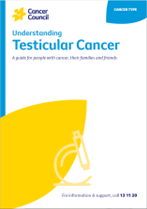- Home
- Testicular cancer
- Diagnosis
- Staging and prognosis
Staging and prognosis for testicular cancer
You will have a range of tests to show whether the testicular cancer has spread elsewhere in your body (the stage). There are several staging systems for testicular cancer, but the most commonly used is the TNM system.
Learn more about:
TNM staging system
In this system, letters and numbers are used to describe the cancer, with higher numbers indicating larger size or spread.
| T (tumour) | describes whether the cancer is only in the testicle (T1) or has spread into nearby blood vessels or tissue (T2, T3, T4) |
| N (nodes) | describes whether the cancer has spread to nearby lymph nodes in the abdomen – N0 means it has not and N1–3 means it has |
| M (metastasis) | describes whether the cancer has spread to distant lymph nodes, organs or bones – M0 means it has not and M1 means it has |
Staging
Based on the TNM scores and the levels of tumour markers in the blood, the doctor then works out the cancer’s overall stage from stage 1 to stage 3. Most testicular cancers are found at stage 1.
Each of the following stages is further divided into several sub-stages, such as A, B and C:
- stage 1 – cancer is found only in the testicle (early-stage cancer)
- stage 2 – cancer has spread outside the testicle to nearby lymph nodes in the abdomen or pelvis
- stage 3 – cancer has spread to lymph nodes outside the abdomen or pelvis (e.g. in the chest) or other areas of the body.
Prognosis
Prognosis means the expected outcome of a disease. You may wish to discuss your prognosis with your doctor, but it is not possible for anyone to predict the exact course of the disease.
To assess your prognosis, your doctor will consider:
- your test results
- the type of testicular cancer you have
- the stage of the cancer
- other factors such as your age, fitness and medical history.
Testicular cancer has the highest survival rates of any cancer (other than common skin cancers). Regular monitoring and review (active surveillance) are major factors in ensuring good outcomes, so it’s vital that you attend all your follow-up appointments.
→ READ MORE: Your health care team
Podcast: Coping with a cancer diagnosis
Listen to more of our podcast for people affected by cancer
More resources
Dr Benjamin Thomas, Urological Surgeon, The Royal Melbourne Hospital and The University of Melbourne, VIC; A/Prof Ben Tran, Genitourinary Medical Oncologist, Peter MacCallum Cancer Centre, Walter and Eliza Hall Institute of Medical Research and The University of Melbourne, VIC; Dr Nari Ahmadi, Urologist and Urological Cancer Surgeon, Chris O’Brien Lifehouse, NSW; Helen Anderson, Genitourinary Cancer Nurse Navigator, Gold Coast University Hospital, QLD; Anita Cox, Youth Cancer – Cancer Nurse Coordinator, Gold Coast University Hospital, QLD; Dr Tom Ferguson, Medical Oncologist, Fiona Stanley Hospital, WA; Dr Leily Gholam Rezaei, Radiation Oncologist, Chris O’Brien Lifehouse and Royal Prince Alfred Hospital, NSW; Dheeraj Jain, Consumer; Amanda Maple, 13 11 20 Consultant, Cancer Council SA; Jessica Medd, Senior Clinical Psychologist, Department of Urology, Concord Repatriation General Hospital and Headway Health, NSW.
View the Cancer Council NSW editorial policy.
View all publications or call 13 11 20 for free printed copies.

